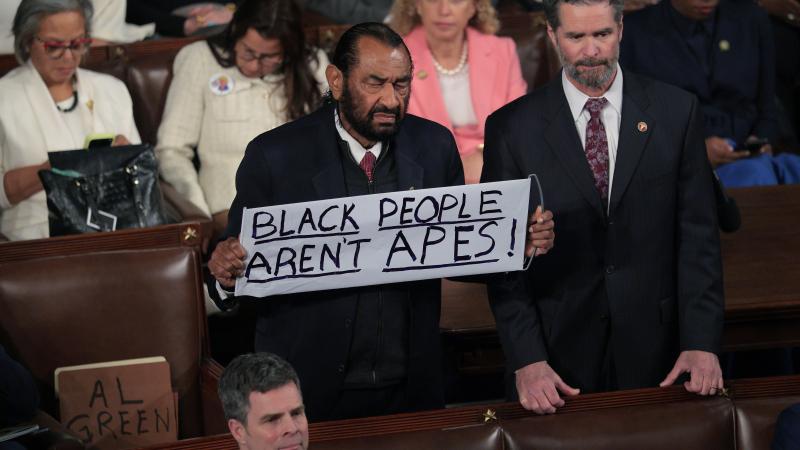Jan. 6 panel’s Ron Johnson narrative exposes ills of one-sided hearing
Full text messages show VP Pence team already knew about alternate electors, expected them by mail
The headlines blared Thursday morning, all but suggesting Wisconsin GOP Sen. Ron Johnson was involved in a conspiracy to force alternate electors on Vice President Mike Pence during the chaotic, violently tragic day that was Jan. 6, 2021.
"Ron Johnson tried to hand fake elector info to Mike Pence on Jan. 6, panel reveals," the Washington-based new organization Politico declared.
To be fair, that's exactly the headline the Democrat-led Jan. 6 committee fed the news media on Wednesday, releasing select text messages between Johnson’s chief of staff and one of Pence’s top aides suggesting there was a plot hatched to hand an envelope of alternate Donald Trump electors to the vice president for the state of Wisconsin.
In reality, according to the full slate of text messages and interviews with people involved, the truth is far different.
Johnson never handed any such alternate electors’ slate to Pence. Johnson’s staff got an urgent request, quickly researched it and stood down, specifically telling the senator he should not do it.
Secondly, this wasn’t a long-hatched plot, at least as it related to Johnson. The entire time of conversation in which the idea was requested, checked out and knocked down took just 70 minutes, the text messages show. And Pence's staff already knew about the alternate electors before Johnson's team even inquired, the messages show.
According to interviews, the Trump campaign and its lawyers had been working on recruiting alternate electors that would switch the vote from Democrat Joe Biden to President Trump in several battleground states during the Jan. 6 certification in Congress presided over by Pence.
Just a short while before the process began, a Trump campaign official asked a Pennsylvania congressman’s office to help get the alternate slate to Pence.
The office of GOP Rep. Mike Kelly, of Pennsylvania, called a Wisconsin lawyer named James Troupis, who knew Johnson and relayed the message to the senator, who wasn't even told at first what specifically was in the envelop.
"Need to get a document on Wisconsin electors to you the VP immediately," Troupis texted Johnson. "Is there a staff person I can talk to immediately. Thanks, Jim T."
That was sent at 11:36 a.m. on Jan. 6. Johnson asked his chief of staff, Sean Riley, to find out what is going on a few minutes later.
Riley reached out to a top Pence aide, Chris Hodgson, in text messages the committee selectively released.
"Johnson needs to hand something to VPOTUS," Riley texted Hodgson.
"What is it?" the VP’s staffer inquired.
"Alternate slate of electors for MI and WI because archivists didn’t receive them," Johnson’s aide explained.
"Do not give that to him," Hodgson wrote back.
That's where the committee's media narrative ended. Except there was much more.
The ensuing text messages show Pence's staff already knew about the alternate electors and expected them to be arriving by mail. And Johnson’s staff immediately took the advice and stood down.
"He’s about to walk over to preside over the joint session," Hodgson wrote the Johnson staffer, stressing he already knew about the electors. "Those were supposed to come in through the mail."
"I can do that. Anything else?," Riley asked, clearly signaling he was standing down.
"The VP absolutely should not receive any mail that hasn’t been screened," Hodgson explained.
"Understood. Johnson understands," Riley wrote back.
A few minutes later, the senator texted back Troupis, stating he was not going to deliver any such package.
"We have been informed the VP cannot accept any unsealed mail and I cannot hand it to him," the two-term senator texted Troupis back at 12:46 p.m., exactly 70 minutes later.
While the Trump campaign's effort to recruit alternate electors, pressure the Justice Department and Pence or sued to block election results have raised legitimate questions, the facts about Johnson's brief cameo in the drama are far more nuanced.
In traditional hearings, such additional evidence that provided context to what really happened would have been made public at the same time by the minority investigative team, which would have access to the same evidence.
But this Jan. 6 committee's majority Democrats have denied Republicans the right to seat their own members and instead cherry-picked two anti-Trump Republicans, Reps. Liz Cheney and Adam Kinzinger, as the sole opposition party members.
The dynamic has suppressed challenges and crafted just one side of the story, leading to several false narratives being offered to the public.
For instance, former NYPD Commissioner Bernie Kerik was falsely accused of attending a meeting in Washington, D.C., on Jan. 5, 2021, to plot to overthrow the election results. He did not, in fact, phone, and toll records show he was in New York.
Likewise, GOP Rep. Barry Loudermilk was accused of leading a reconnaissance mission of the Capitol the day before the riots with some of the insurrectionists, a charge that lingered in public for weeks.
But Capitol Police actually reviewed the security footage and found Loudermilk did not lead a reconnaissance mission and didn’t even set foot in the Capitol, instead taking a group of constituents on a tour and lunch in a congressional office building that involved nothing "suspicious."
The narrative about Johnson now provides a fresh example of how Democrats have controlled a storylines to wound their opponents – Johnson is a top target for Democrats in the 2022 Senate elections – without the benefit of contradictory evidence or a defense.
Just the News reached out to all the parties. Troupis’ lawyer declined comment. A spokesman for Pence said he was out of the country
Kelly’s office said Thursday night he did not have any conversations with Johnson but did not address whether he or staff had contact with Troupis.
“Senator Johnson’s statements about Representative Kelly are patently false. Mr. Kelly has not spoken to Sen. Johnson for the better part of a decade, and he has no knowledge of the claims Mr. Johnson is making related to the 2020 election,” Kelly spokesman Matthew Knoedler said.
Johnson’s office offered the following comment: "The senator had no involvement in the creation of an alternate slate of electors and had no foreknowledge that it was going to be delivered to our office."
Johnson’s office also said: "This was a staff to staff exchange.
"His new chief of staff contacted the vice president’s office. The vice president’s office said not to give it to him and we did not. There was no further action taken."
That account matches the full suite of text messages that were not fully released by the committee.














